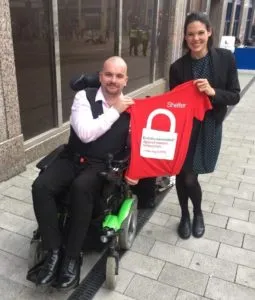Judgment from Shelter’s second ‘No DSS’ court win reveals letting agent caused ‘distress and humiliation’ to disabled tenant
Published: by Rose Arnall

In September last year, we shared the news of a second Shelter court case declaring DSS discrimination unlawful, marking another huge breakthrough for our End DSS Discrimination campaign.
Disabled dad-of-four Stephen Tyler was barred from viewing properties advertised by a Birmingham estate agent, purely on the grounds that he was receiving housing benefit.
This week, the official transcript of the Court’s Judgment has been published, so we can now share some of the important detail behind this landmark decision.
Stephen’s story
Stephen is a disabled man who has used a wheelchair since a road traffic accident in December 2016. His family became homeless in February 2018 after they asked their private landlord to make some disability adaptations to their home. The landlord responded by serving the family with a Section 21 ‘no-fault’ eviction notice.
The family asked their local council for help. They were also desperately searching for their own private rented accommodation, where they were coming up against DSS discrimination. By September 2018, Stephen had no choice but to sleep in his car while his wife and children crowded into his mother-in-law’s home. They then found three suitable and affordable properties advertised by a large estate agent, which were perfectly located for their children’s schools and near to their family for support.
But when they called about the properties, they were told it was ‘company policy’ to refuse to rent to people who receive housing benefit. This happened even though the family could pay a deposit, had a guarantor and a solid record of paying rent in full and on time.
Unlawful discrimination
Shelter has been arguing for some time that, because disabled people like Stephen are more likely than non-disabled people to receive housing benefit, blanket bans against letting to housing benefit tenants have an unfair impact on them, and are therefore unlawfully indirectly discriminatory.
Her Honour Judge Stacey, now a High Court judge, acknowledged Shelter’s hard work to raise awareness of DSS discrimination in her judgment. She said: ‘It is well known in the housing rental sector that the impact of a “No DSS” rule impacts disproportionately to the disadvantage of disabled people, thanks partly to the campaigning work of Shelter,’ and confirmed once and for all that:
-
‘”No DSS” policies lock a significant number of private renters out of homes which they could otherwise afford and would be suitable for them, simply because they are on housing benefit and without consideration of their specific situation.’
-
‘Through [Shelter senior research officer] Mr Reynolds’ evidence, it has been established that disabled people in receipt of disability benefits more generally are also put at that particular disadvantage of not being considered for private rental properties. The statistics are stark and worth repeating: in the private rented sector 44.6% of disabled persons claim Housing Benefit compared to 15.1% of non-disabled persons and in respect of all occupiers of housing, 33.3% of disabled people claim Housing Benefit compared to 6.7% of non-disabled people. Disabled people are between three and five times more likely to claim Housing Benefit than non-disabled people and, correspondingly between three and five times more likely to be excluded by a No DSS policy than non-disabled people.’
Feeling written off and disrespected
In Stephen’s case, the letting agent’s unfair rejection was a significant blow to the family at a time when they were in serious need of a new home.
‘Depriving him of even being considered…felt personal, humiliating and lost him the opportunity to live in any of those properties. Such a policy also significantly increased the stress and time taken to obtain accommodation.’
Judge Stacey
Despite, or perhaps because of, the huge impact upon him, Stephen worked tirelessly together with Shelter to bring his case to court, and fight for his and other disabled people’s right to equal treatment. He wanted to try to stamp out this practice and stop it happening to anyone else.
This was incredibly difficult for him. Court cases are long and stressful at the best of times, but in this particular case, Stephen had to contend with the added pressure of the estate agent trying to cast doubt on his honesty and integrity. Luckily, the judge saw through these disturbing tactics.
In the judgment, Judge Stacey made a point of recognising Stephen’s strength of character. She said: ‘He is an energetic and determined young man seeking to provide for his family and do the best for them’. She also recognised the added insult to injury that the agent’s behaviour during the court proceedings had caused, saying:
‘The injury to feelings has been aggravated by the manner in which the proceedings have been conducted by the Defendant. They sought to assert that the claim was fabricated and that the telephone conversation did not take place, that the whole thing was a setup, the Tylers were not homeless and had already found somewhere else to live at 167 South Road. It was effectively suggested that the Tylers had effectively lied and invented the claim as some sort of campaigning strategy. The nature of the cross-examination will have further added to the injury to the Claimant’s feelings.’
Letting agent faced with bill of over £55,000
The final judgment awarded Stephen £6,180 compensation but it also ordered the estate agents to pay for all of his legal costs – a sizeable £35,000. They would also have had to pay their own legal costs, estimated to be at least £15,000. That brings the grand total cost of their decision to discriminate against Stephen to over £55,000. A hefty bill indeed, which reflects the seriousness of the consequences of pursuing such action.

Thank you Stephen for your determination and bravery
At Shelter, we are so incredibly proud of Stephen, and grateful to him for standing up and fighting with such dignity. He worked tirelessly, despite facing stigmatising shame and prejudice that often comes with benefits discrimination.
Practices that make assumptions about people in receipt of benefits – that they are worth less in our society than others – are unfair, outdated and now unlawful. Everyone is entitled to equal treatment and fair consideration, regardless of where their income comes from.
If you are experiencing DSS discrimination while searching for a home, we’ve created a template letter you can send to the agent and challenge their behaviour.
Shelter will carry on fighting until discriminatory practices are stamped out for good. To join the fight, sign up here.